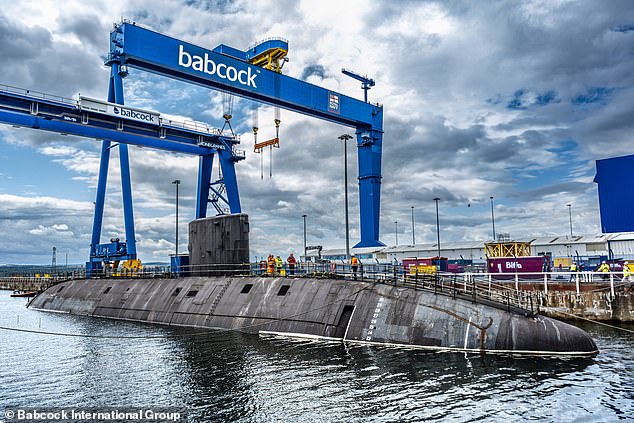- Babcock’s underlying operating profit rose 34% to £238m last year
- Defense companies have benefited from increased military spending by governments
Babcock enjoyed bumper profit growth last year despite continuing to suffer heavy losses from a legacy shipbuilding contract.
The defence contractor said its underlying operating profit rose 34 per cent to £238m in the year to March thanks to strong demand from the nuclear, ground and aviation industries.
Organic revenues rose 11 percent to £4.4 billion, driven by strong 29 percent growth in its nuclear division. The land unit rose 17 percent.
Profitability was hit by a £100m loss on a 2019 deal to build five Type 31 general purpose frigates for the Royal Navy.
Walking on water: Defence contractor Babcock said its underlying operating profit rose 34 per cent to £238m in the year ended March
Last year it recorded a further £90m loss on the legacy contract due to significant engineering and labour costs, but the group still managed to increase core profits by around £60m.
In addition, Babcock’s underlying free cash flow more than doubled from £75m to £160m, attributed to strong operating performance and “temporary benefits from early customer revenues”.
The London-based company achieved this by contributing an additional £35 million to reduce its pension deficit.
Babcock said this helped one of its pension funds become self-sufficient two years faster than expected and should reduce its total pension deficit repair payments to around £40m a year.
Like other defence giants, Babcock has benefited from increased military spending by governments in response to rising tensions in Asia, the Middle East and Eastern Europe.
Total defense spending rose 7 percent to a record $2.4 trillion in 2023, the steepest increase in 15 years, according to the Stockholm International Peace Research Institute.
Last November, Babcock secured a £120m deal to build Dreadnought-class submarines, a £750m contract for infrastructure improvements at Devonport naval base and a seven-year deal to maintain equipment at French military bases.
Since then, it has signed contracts to refit HMS Victorious, train British Army armoured vehicle operators and manufacture weapons systems for South Korean Navy submarines.
The new deals helped the London-based firm’s contract backlog grow 9 percent year-on-year to £10.3 billion in March.
Over the same period, Babcock grew its organic revenue by 9 percent and reduced its net debt by £129 million to £435.4 million.
It has also reinstated dividends after cancelling them at the start of the Covid-19 pandemic, declaring an interim payout of 1.7 pence per share and a final dividend of 3.3 pence per share for the 2024 financial year.
Babcock International Group shares were down 1 percent at 5.33 pounds on Wednesday morning, though they are still up nearly three-quarters in the past year.


